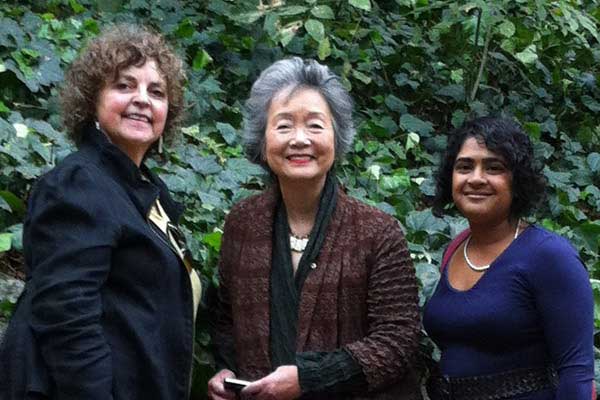
Renu Mandhane to lead Ontario Human Rights Commission
Published: August 14, 2015
The head of the University of Toronto's award-winning International Human Rights Program (IHRP) at the Faculty of Law is poised to become chief commissioner of the Ontario Human Rights Commission.
Renu Mandhane has been nominated by the Ontario government for the post, subject to a final review by the Standing Committee on Government Agencies. She is expected to take up her post in fall 2015 and will play a central role in shaping human rights in the province.
“I want to extend my congratulations to Renu Mandhane on her nomination as Ontario’s new Human Rights Commissioner,” Premier Kathleen Wynne said in a statement. “As a long-time advocate for human rights with a focus on advancing women’s rights, we are fortunate that someone so passionate and experienced will lead the important work done by the Ontario Human Rights Commission.
“I am confident Ms. Mandhane’s leadership will play an integral role as the Office of the Chief Commissioner works to promote a culture of human rights in the province and build a fairer and more inclusive Ontario for all.”
Mandhane started at the Faculty in 2008 as an assistant dean and contributed to an extensive review of the first year curriculum. In 2009, after a competitive national search, she was appointed executive director of the IHRP. Under her leadership, the IHRP has won multiple awards for its groundbreaking work to end discrimination in Canada and abroad.
In recent years, she has worked tirelessly to expand the IHRP through grant-funding from the Social Sciences and Humanities Research Council (SSHRC), the Elton John AIDS Foundation, and the Department of Foreign Affairs and International Trade. More importantly, Mandhane has solidified a unique clinical legal education model that enables law students to work on high-impact files, while building the capacity of NGOs to effectively engage with international law. This work has been repeatedly profiled in national and international media, and resulted in legal and policy changes in Canada and abroad.
“I feel privileged to live in a province where difference is respected and celebrated, but we must be bold in confronting persistent, systemic discrimination,” Mandhane said in a statement. “My work at the international level has impressed upon me how important it is to act locally to ensure sustainable social change. I am humbled to be provided with an opportunity to take up that challenge.”
Attonery General Madeleine Meilleur called Mandhane “a passionate advocate for freedom of speech and the rights of women.”
She added: “Ms. Mandhane will bring invaluable experience to the Office of the Chief Commissioner, and will help solidify Ontario’s leadership on human rights on the global stage.”
Mandhane replaces interim chief Ruth Goba, who stepped in after long-serving former Chief Commisisoner Barbara Hall resigned a few months ago. In a statement, Hall praised the government's choice.
“The journey towards achieving the goal of a culture of human rights in Ontario requires frequent renewal and inspired leadership,” Hall said. “I know that Renu’s experience, commitment and passion will provide just that for Ontarians.”
The Ontario Human Rights Commission was established in 1961 to administer the Ontario Human Rights Code. The commission develops public policy on human rights, conducts public inquiries, and promotes a culture of human rights in the province. The commission also has the power to monitor and report on anything related to the state of human rights in Ontario.



